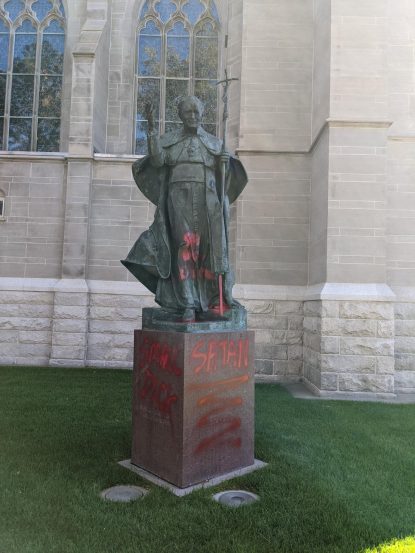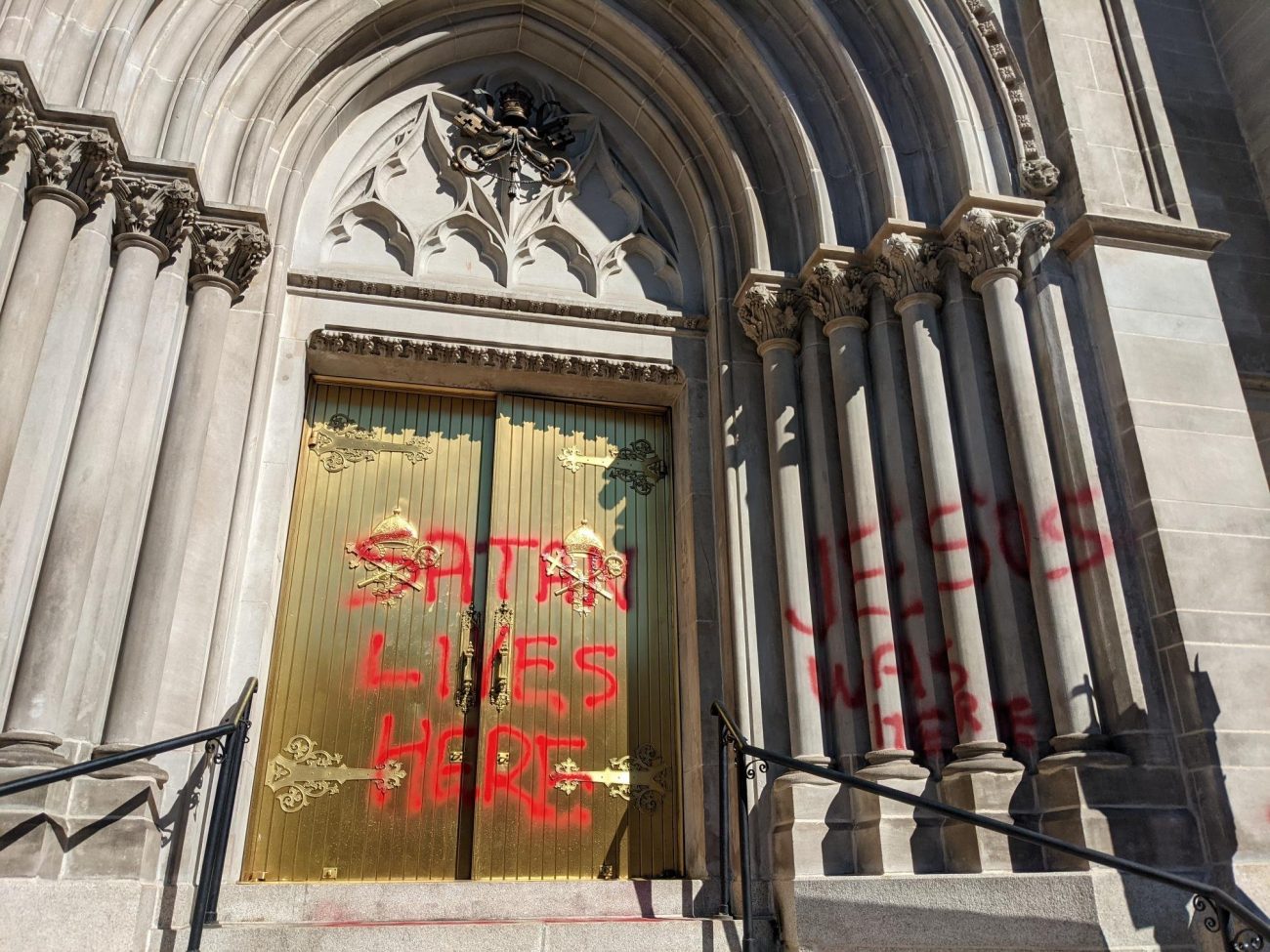DENVER (CNS) — The Archdiocese of Denver said Oct. 10 that Catholics “continue to pray for the conversion of those who carry out acts of desecration against our churches, statues and religious symbols.”
The statement was released to the news media after the Cathedral Basilica of the Immaculate Conception in downtown Denver was vandalized with messages and symbols of hate written in red paint on the cathedral.
Parish officials estimated the vandalism took place between 7:30 a.m. and 8:30 a.m. Oct. 10. Graffitied messages such as “Satan Lives Here” and “Illuminati” and swastikas were splashed on doors, including the main entrance doors, and on at least one statue. There also were references to “child rapists.”
[hotblock]
The building was cleaned with the help of volunteers.
KDVR-TV reported the incident was being investigated as a possible bias-motivated crime. Denver police confirmed to the news outlet that they interviewed a witness to the incident but did not release any information on a possible suspect.
“It continues to be troubling to see the increased reports of vandalism at Catholic churches, both across the county and in our archdiocese, and it is certainly unfortunate when our parishes are targeted simply because of our beliefs,” the archdiocesan statement said.
Since February 2020, the Archdiocese of Denver is aware of at least 25 parishes or ministry locations that have been the target of vandalism, property destruction or theft.
“This has included broken windows, damaged and defaced statues, graffiti, attempted arson, vehicle damage, stolen religious items, and other break-ins and thefts,” it said. “More than 10 incidents have occurred in the last six months.”

The Cathedral Basilica of the Immaculate Conception in Denver is seen vandalized Oct. 10, 2021. Since February 2020, the Archdiocese of Denver is aware of 25 parishes or ministry locations in northern Colorado that have been the target of vandalism, property destruction or theft. (CNS photo/courtesy Archdiocese of Denver)
One of those incidents took place the early morning hours of Sept. 29 at Sacred Heart of Mary Catholic Church in Boulder County, north of Denver, when graffiti was splashed on the church walls, the doors and nearby signs. One message said, “Jesus Loves Abortion.”
Three weeks before that St. Louis Catholic Church, also in Boulder County, was tagged with “pro-abortion” messaging.
“Some of the incidents have been clearly targeted at the Catholic Church, but not all of them,” the archdiocesan statement said. “The number could be higher because some minor incidents are not always reported.”
Father Samuel Morehead, pastor and rector at the cathedral basilica, told 4CBS Denver attack on the archdiocese’s mother church “was offensive” and that he thought it was “either an act by somebody who is mentally unstable, or a true act of hate against Catholics.”
The Committee for Religious Liberty of the U.S. Conference of Catholic Bishops began tracking incidents of arson, vandalism and other destruction at Catholic sites across the United States in May 2020.
The Oct. 10 vandalism in Denver marked the 100th such incident nationwide, the committee reported.
The chairmen of the USCCB’s Committee for Religious Liberty and Committee on Domestic Justice and Human Development — Cardinal Timothy M. Dolan of New York and Archbishop Paul S. Coakley of Oklahoma City, respectively — deplored the incidents in statement Oct. 14.
“We call on our elected officials to step forward and condemn these attacks,” they said. “We thank our law enforcement for investigating these incidents and taking appropriate steps to prevent further harm. We appeal to community members for help as well. These are not mere property crimes – this is the degradation of visible representations of our Catholic faith. These are acts of hate.”
The committees have joined numerous other faith groups in the U.S. to advocate for increased funding by Congress for the U.S. Department of Homeland Security’s Nonprofit Security Grant Program.
They seek double the funding for the program in the current fiscal year to $360 million in fiscal 2022.
PREVIOUS: Military members deploying conscience in fight against vaccine mandate
NEXT: Initiatives on Eucharist aim to give Catholics better understanding




Share this story